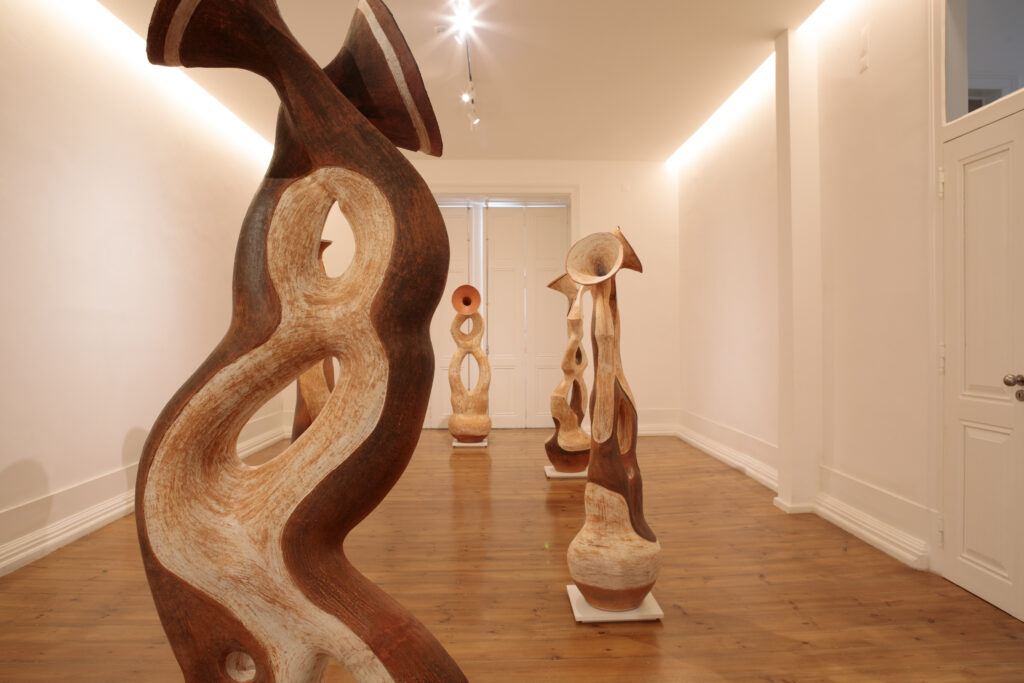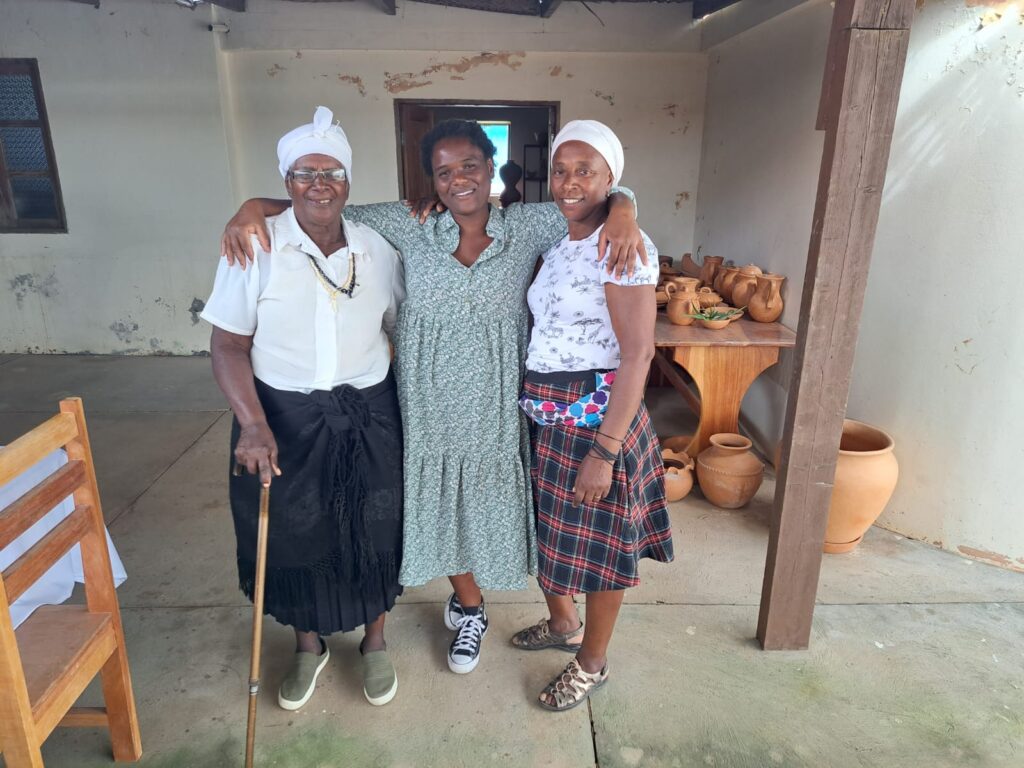Über Biografien, Keramik und die Schwierigkeit as kapverdische Frau als Künstlerin anerkannt zu werden.

Moringo
Keramik und Engoben
2020
(ein traditionelles kapverdisches Objekt, das zum Transport und zur Kühlung von Wasser verwendet wird)
Jacira da Conceição
Presented by Schattenmuseum
Lebt in Portugal und Capo Verde
*1990 in Chão Bom, Santiago Island, Capo Verde
Während der Forschung zur Vorbereitung unserer Performance haben wir uns mit Kunst im Globalen Süden und mit Kolonialismus beschäftigt, mit Werken und Künstler*innen, die an der Ausstellung O Quilombismo beteiligt waren und haben Interviews geführt mit Menschen, die die Ausstellung entwickeln. Wir haben uns mit Biografien und Erinnerungen aus unseren Familienarchiven auseinandergesetzt und dazu Keramik-Skulpturen hergestellt.

Dann sind wir auf die Kapverden gestoßen und haben die Keramik-Künstlerin Jacira da Conceição interviewt, die sich mit ähnlichen Themen befasst wie wir. Per Videokonferenz haben wir sie in ihrer kleinen Küche in Portugal kennengelernt, die ebenso als ihr Atelier für große Tonskulpturen dient. Obwohl Jacira sich als schüchtern beschreibt, hat sie sich Zeit genommen, um mit uns über sich, ihr Leben und ihre Auffassung von Kunst zu unterhalten – mit der Bitte, dass sie während unseres Interviews an ihrer Skulptur weiter arbeiten kann, um diese für ihre Ausstellung in Lissabon fertigstellen zu können. Während dem Interview mit ihr entstand in uns, als Mitglieder des Schattenmuseums, der große Wunsch, ihr den Raum zu schaffen, den sie sich für ihre Kunst und für die Kapverden wünscht. Als wir ihr von unserer Idee erzählten, ihre Kunst im Rahmen unserer Aliens-Performance nach Berlin ins HKW zu bringen, bestätigte sich die Wichtigkeit unseres Vorhabens: Sie freute sich sehr und versprach uns, ein kleines Werk von ihr zu schicken!
„Natürlich, es wäre die Verwirklichung eines Traums. Je mehr Raum eine schwarze Frau hat, eine Frau wie ich, kapverdisch, desto mehr Einfluss wird das haben, desto mehr Aufmerksamkeit werden kapverdische Frauen bekommen und desto mehr können sie sich ermächtigt fühlen, an einem Ort zu sein, an dem sie momentan nicht sind.” (Jacira da Conceição in unserem Videointerview)

Wir, das Schattenmuseum, verstehen uns als alternativer Ansatz, ein Museum zu denken und als Netzwerk, das Vorschläge für Institutionen zum Umgang mit Communitys, Sammlungen und edukativen Möglichkeiten erarbeitet. Inhalte, Methoden und künstlerische Formate werden kollaborativ entwickelt und umgesetzt. Wir orientieren uns an konkreten Strukturen, Bedürfnissen und Zielen der jeweiligen Institution. Wir eröffnen Experimentierfelder und Versuchsanordnungen, die Raum für Dialoge und Fragen bieten und verschiedene Besucher*innengruppen und deren Perspektiven einbeziehen.
Mit der „O Quilombismo”-Ausstellung wird das HKW zum Ausstellungsraum für viele Künstler*innen aus verschiedenen Ländern der Welt. Wir möchten daher Jacira den Raum geben und sie als Künstlerin unter dem Dach des Schattenmuseums mit einer ihrer Skulpturen in der Quilombismo-Ausstellung vorstellen.

Jacira da Conceição ist eine Künstlerin, die mit dem traditionellen Handwerk der Keramik arbeitet und deren künstlerische Arbeit eng mit ihrer kulturellen Identität verwoben ist. Sie ist 1990 auf der Insel Santiago, Cabo Verde geboren und aufgewachsen und lebt und arbeitet auf den Kap Verden und Portugal. In ihrem Werk beschäftigt sie sich intensiv mit den Elementen der Natur und mit der Beobachtung des Immateriellen. Das Arbeiten mit Keramik bedeutet für sie eine sehr poetische Annäherung an das Material, das schon bei der Handhabe die Natur in ihrer Schönheit, ihrer ursprünglichen Harmonie, ihrer tiefen Verbundenheit mit ihren Elementen Wasser, Feuer, Raum, Licht und Zerbrechlichkeit widerspiegelt. Jacira da Conceição versteht ihre künstlerische Handlung als Verschmelzung mit dem Raum, der täglichen Bewegung, dem Leben selbst. Gleichzeitig stehen die Gemeinschaft und ihre traditionellen Techniken dieses zumeist von Frauen verübten Handwerks, im Zentrum ihrer künstlerischen Arbeit, aber auch die Insel, die Bedeutung des Regens und des Ozeans, die zeitlichen Epochen, die Gemeinschaft der Töpferinnen und deren Verwandtschaft in Gesten und Geist, als auch die Tatsache, dass die Erde etwas Gemeinsames ist. Eine fast rituelle Poesie geht von ihrer Arbeit aus, weibliche Gefäße erzählen von einer weiblichen Vision des Daseins. „Der Topf ist ein Ort, der Menschen zusammenbringt, der von Hand zu Hand weitergereicht wird, aus Erde gemacht, der selben, die uns trägt“.

Die Erde, die Jacira da Conceição thematisiert, meint unter Anderem Kap Verden, eine vulkanische Inselgruppe vor der Nordwest-Küste Afrikas. Ihre kreolisch-portugiesisch-afrikanische Kultur, das trockene Klima und eine sehr gewaltvolle (und dünn dokumentierte) Kolonialgeschichte haben das Land geprägt. Zuerst unbewohnt, dann kolonialisiert von Portugal als Umschlagplatz des Sklavenimports und -exports, später Hunger und bittere Armut und schließlich massive Abwanderung der (überwiegend) männlichen Bevölkerung. Zurück blieben viele Frauen und Kinder, die häufig den Kontakt hielten zu ihren Ehemännern, die auf Schiffen und in europäischen Häfen arbeiteten, um sich und die Ihren einigermaßen versorgen zu können. Entsprechend prägte das die Rolle der Frauen in der kapverdischen Gesellschaft.
Mit freundlichen Grüßen vom Schattenmuseum,
Laith Azimi, Romy Drieschner, Mariama Juric, Ena Kampel, Elis Nägele, Phanuel Nlend Nlend, Elijah Sagor, Elona Sagor, Moritz Scheffer, Cem Yildiz
Jacira da Conceição wurde 1990 in Chão Bom, Insel Santiago, Kap Verden, geboren. Im Jahr 2007 begann sie eine Ausbildung in traditioneller Töpferei am Centro de Artes e Ofícios de Trás di Munti. 2009 reiste sie zum ersten Mal außerhalb der Kap Verden, wo sie Kontakt zu den Töpfer*innen in Quilombo Itamatatiua, Brasilien, aufnahm. 2016 nahm sie an der Ausstellung von Pedro da Conceição Frau in der Schwebe im Kulturpalast Ildo lobo teil. Im Jahr 2020 stellte sie in Lissabon im Kulturzentrum der Kapverden in der Ausstellung da saudade do sal da terra mit Pedro da Conceição aus. 2021 war sie eingeladen, ihre Werke an der UCLA auszustellen, in der ersten Gruppenausstellung zeitgenössischer kapverdischer Künstler*innen from the inside out. Sie hatte ihre erste Einzelausstellung Badia im Museu de Arqueologia e Etnografia de Setúbal und ihre erste internationale Ausstellung in der Galerie der Botschaft von Kap Verde in Paris. 2022 nahm sie teil an der Gruppenausstellung The State of the World: South Atlantic Museum in den Galerias Municipais de Lisboa, Palácio Pimenta, Pavilhão Branco und hatte 2023 mit Tchom Bom eine Einzelausstellung im CCCV – Cape Verde Cultural Center in Lissabon und mit Mar Interior in derStädtischen Galerie von Montemor-o-Novo, Portugal.

English Version:
During the research to prepare our performance, we dealt with art in the Global South and colonialism, with art works and artists who were involved in the O Quilombismo exhibition and conducted interviews with people who developed the exhibition. We dealt with biographies and memories from our family archives and made ceramic sculptures to this.

Then we came across Cape Verde and interviewed the ceramic artist Jacira da Conceição, who deals with similar themes as we do. Via video conference, we got to know her in her small kitchen in Portugal, which also serves as her studio for large clay sculptures. Although Jacira describes herself as shy, she took the time to talk to us about herself, her life, and her understanding of art – with the request that she could continue working on her sculpture during our interview in order to complete it for her exhibition in Lisbon.
During the interview with her, we, as members of the Shadow Museum, had a great desire to create the space she would love to have for her art and for Cape Verde. When we told her about our idea to bring her art to the HKW in Berlin as part of our Aliens performance, the importance of our project was confirmed: she was very happy and promised to send us a small piece of her work!
„Of course, it would be the realization of a dream. The more space a black woman has, a woman like me, Cape Verdean, the more influence it will have, the more attention Cape Verdean women will get, and the more they can feel empowered to be in a place where they are not currently.“ (Jacira da Conceição in our video interview).

We, the Shadow Museum, see ourselves as an alternative approach to conceiving a museum and as a network that develops suggestions for institutions on how to deal with communities, collections, and educational opportunities. Content, methods, and artistic formats are collaboratively developed and implemented. We orient ourselves to the specific structures, needs, and goals of the respective institution. We open up experimental fields and experimental arrangements that offer space for dialogues and questions and include different visitor groups and their perspectives.
With the O Quilombismo exhibition, the HKW becomes an exhibition space for many artists from different countries around the world. We would therefore like to give Jacira the space and present her as an artist under the roof of the Shadow Museum with one of her sculptures in the O Quilombismo exhibition.

Jacira da Conceição is an artist who works with the traditional craft of ceramics, and her artistic work is closely interwoven with her cultural identity. Born and raised in 1990 on the island of Santiago, Cabo Verde, she lives and works in Cape Verde and Portugal. In her work, she is deeply involved with the elements of nature and with the observation of the immaterial. Working with ceramics for her means a very poetic approach to the material that reflects the beauty, original harmony, and deep connection of nature with its elements water, fire, space, light, and fragility even in its handling. Jacira da Conceição sees her artistic action as a fusion with the space, the daily gesture, life itself. At the same time, the community and its traditional techniques, mostly performed by women, are at the center of her artistic work, but also the island, the significance of rain and the ocean, the temporal epochs, the community of potters and their kinship in gestures and spirit, and the fact that the earth is something shared. An almost ritual poetry emanates from her work, female vessels tell of a female vision of existence. „The pot is a place that brings people together, that is passed from hand to hand, made from earth, the same one that carries us.”

The earth that Jacira da Conceição addresses refers, among other things, to Cape Verde, a volcanic archipelago off the northwest coast of Africa. Its Creole-Portuguese-African culture, the dry climate, and a very violent (and thinly documented) colonial history have shaped the country. At first uninhabited, then colonized by Portugal as a transshipment point for the import and export of slaves, later experiencing hunger and bitter poverty, and finally massive emigration of the (predominantly) male population. Many women and children were left behind, often maintaining contact with their husbands who worked on ships and in European ports to provide for themselves and their families. This correspondingly shaped the role of women in Cape Verdean society.
Jacira da Conceição was born in 1990 in Chão Bom, Santiago Island, Cape Verde. In 2007, she began training in traditional pottery at the Centro de Artes e Ofícios de Trás di Munti. In 2009, she traveled outside Cape Verde for the first time, making contact with the potters in Quilombo Itamatatiua, Brazil. In 2016, she participated in the exhibition of Pedro da Conceição Woman in Balance at the Ildo Lobo Cultural Palace. In 2020, she exhibited in Lisbon at the Cape Verde Cultural Center in the exhibition Da Saudade do Sal da Terra with Pedro da Conceição. In 2021, she was invited to exhibit her works at UCLA, in the first group exhibition of contemporary Cape Verdean artists from the inside out. She had her first solo exhibition Badia at the Museu de Arqueologia e Etnografia de Setúbal and her first international exhibition at the Embassy Gallery of Cape Verde in Paris. In 2022, she participated in the group exhibition The State of the World: South Atlantic Museum in the Galerias Municipais de Lisboa, Palácio Pimenta, Pavilhão Branco. She had a solo exhibition in 2023 with Tchom Bom at the CCCV – Cape Verde Cultural Center in Lisbon and with Mar Interior at the Municipal Gallery of Montemor-o-Novo, Portugal.

